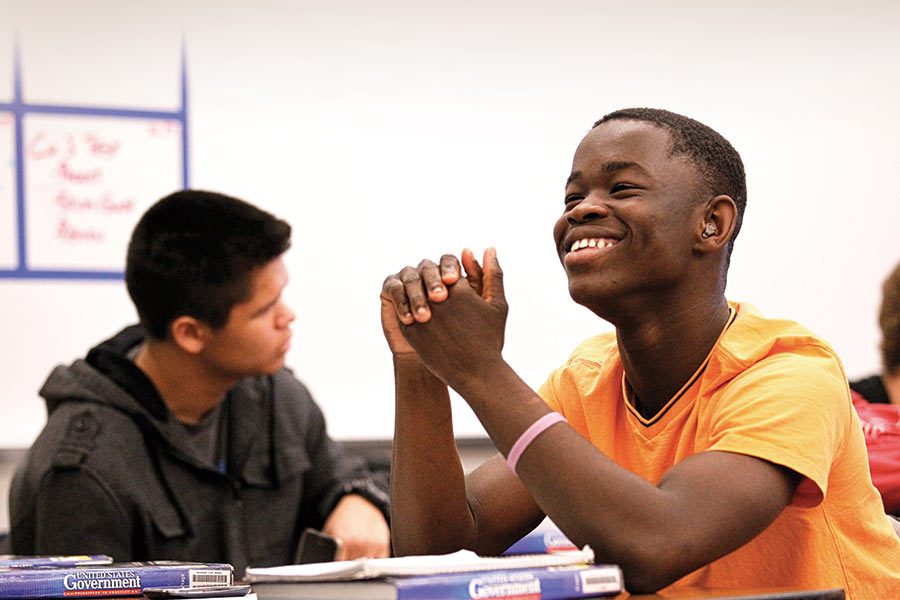Sign Language Interpreting Program helps students make strides
by Melissa Tav
A bright and inquisitive smile flashes across the face of 17-year-old Emmanuel Akande. He sits near Sophie Powell, his interpreter intern, toward the front of his classroom at Buchanan High School. Akande is hard of hearing. And on this day, he bounces with excitement as he tells Powell about his upcoming class at the Center for Advanced Research and Technology (CART).
The happy-go-lucky kid sitting in the classroom is a stark contrast from the student he was just seven years ago. At the time, he did not have an interpreter at his school. He felt hopeless and isolated — a victim of an educational system that lacked certified sign language interpreters.
Today is a different story. Akande is thriving and has dreams of one day working in the medical field.
“Having an interpreter changed my life,” Akande says. “Now I am able to learn just like everyone else.”
Like many hard of hearing or deaf students, Akande requires an interpreter for certain classes, such as lectures.
A qualified interpreter who is able to teach the lessons and accurately interpret what the teacher is saying is paramount for students who might have difficulty understanding more complex subjects like math or science.
Up until fifth grade, Akande did not have an interpreter, but that all changed when he transferred to the Clovis Unified School District.
Powell, a senior from Fontana, chose to enroll at Fresno State because it is one of only two, four-year interpreting programs in California. The 2013 California Special Education Personnel Data Report indicates that about 118 educational interpreting support jobs are currently vacant, and about 7 percent of interpreters do not meet state qualification standards.
Sandra Hart, interpreting coordinator for Clovis Unified, says the Fresno State sign language interpreting program addresses a major need for qualified interpreters in the Central Valley.
“Eight years ago, we started accepting interns from Fresno State and realized it was the perfect way to meet up-and-coming interpreters,” Hart says. “We’ve been able to hire them once they graduate because they come in with a better understanding of the educational setting, which is so important.”
Hart said out of the 18 interpreters in Clovis Unified, 13 are alumni of Fresno State.
The Fresno State interpreting program was developed in 2002 to address the growing need of providing communication access for individuals who are hard of hearing or deaf. Between 10 and 20 students per semester are placed in internships around the Central Valley, including school, religious, deaf, blind and community settings. Each student is required to complete a minimum of 150 internship hours to earn a bachelor’s degree in interpreting.
“Interpreters have an important role in educational settings, because they facilitate communication, advocate for students and serve as language models who can provide a vital contribution to the cognitive, social and emotional development of deaf youth, whose needs are often underserved,” says Dr. Peter Crume, coordinator of the Fresno State interpreting program.
Through the program, each intern is paired with a certified interpreter who serves as a mentor. In May 2014, 16 students graduated from the interpreting program and are now working in the Central Valley.
“While interpreters certainly enhance the communication access for deaf individuals, interpreters also provide Valley residents with greater access to the deaf community,” Crume says.
There are currently 28 students throughout Clovis Unified who require an interpreter or signing aide.
Across campus at Garfield Elementary, first-graders Jazlene Jimenez and Hailey Baroni (pictured above) learn about shapes in Mrs. Gutierrez’s first-grade classroom as intern Courtney Dull, of Fresno, signs to them near the front of the class. Not far from Dull is Michelle Tindall, a Clovis Unified interpreter who serves as her mentor.
Tindall has been an interpreter for the past two years and is also a product of Fresno State, having graduated in 2012. She says the program prepared her for the workforce.
“The program is really beneficial in allowing students the hands-on experience needed,” Tindall says. “Without that experience of coming into the classroom and actually getting to interpret in that setting, you would miss out on so much in terms of learning the importance of skills and interaction.”
As for Akande, when he’s not writing songs or poems, he is dreaming of his future. The senior will graduate in June and has hopes of going to college in New York. It’s a dream that would not be fathomable without the proper interpreting resources that aided his education.
“My interpreters always encouraged me to pursue my future goals,” Akande says. “Now I’m so excited to see where I will go. It feels fantastic.”
— Melissa Tav is a communication specialist for the College of Health and Human Services at Fresno State.






